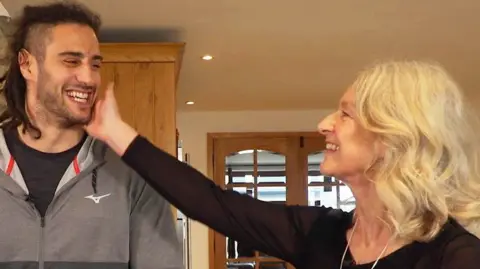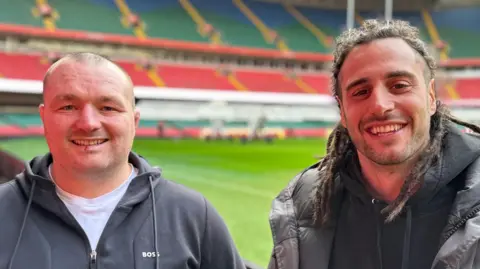Pride of rugby star’s mum after he learns Welsh
 BBC
BBCFormer Wales rugby star Josh Navidi has said his Welsh-speaking mum is “proud” of his efforts to learn the language.
The ex-Cardiff back row has been learning Welsh on Iaith ar Daith on S4C, helped by fellow Wales international Ken Owens, a native Welsh speaker.
"Mum is very proud – after doing the programme, she says, ‘come on, speak more now. Speak more Welsh for me just to keep it up’," he told BBC Cymru Fyw.
Navidi retired from rugby in April 2023 aged 32, having made 33 Wales appearances.
Navidi was born in Bridgend, but his mother, Euros, hails from Llanddona on Anglesey.
His father, Hedy, is from Iran, having left for the UK in 1979 during the Iranian Revolution, and the pair met in Bangor, Gwynedd, where he was studying.
“It helps because mum has started texting me in Welsh,” Navidi said, adding his mum also sends him voice notes in Welsh.
Navidi said he was also speaking Welsh at home to his new-born daughter.
He said he had previously been held back by a lack of confidence using the language.
“I feel it’s easy to flick from Welsh to English. The problem was trying to go back to Welsh after switching to English – I try to keep speaking Welsh in my head,” he said.
He said the crew on Iaith ar Daith encouraged him to say the word in English first, then carry on in Welsh.
“It was an amazing experience and I’m so glad I did it. For anyone who wants to go back to the Welsh language, just go and do it,” he said.
 S4C
S4CNavidi was also full of praise for Owens, Wales’ most capped hooker and oldest captain, who retired in April, aged 37.
“Ken is the star for me – he has helped me loads, and [helped with the] words more than anything,” Navidi said.
“I was just asking Ken for a couple of words and off we went.”
Navidi also spoke of his active lifestyle since retiring, including turning his hand to commentating, DJing and selling cars.
He acknowledged that many professional players find it difficult when they retire, but that he was “lucky because I had the car stuff going on”.
“With rugby, you rely on someone else to do everything for you – you turn up, put your boots on and off you go. It can be a difficult change,” he said.
